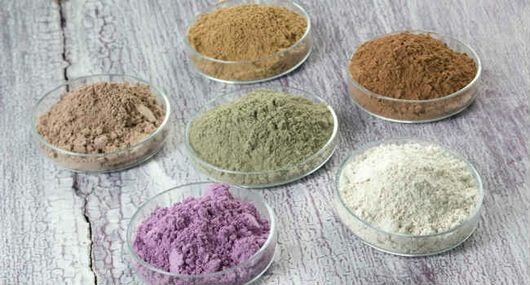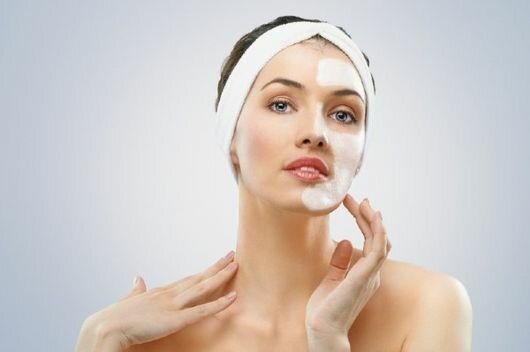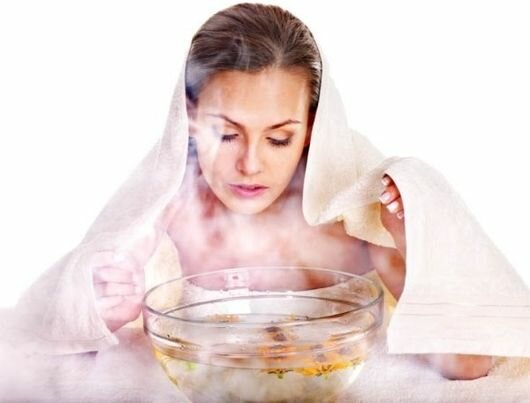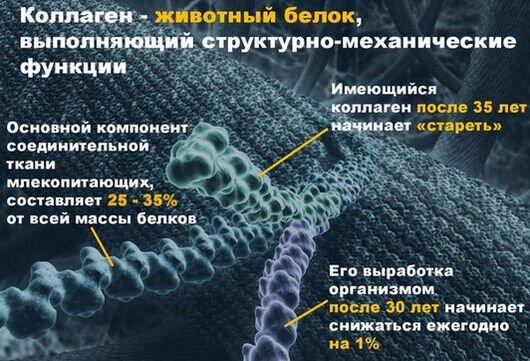To extend the beauty of the skin of the face, cosmetic clay is best suited. Many varieties of rocks with a predominance of certain minerals allow them to be used by all categories of women.
- Types of Cosmetic Clay
- Features of different types of clay
- Clay masks by skin type
- Rules for the use of cosmetic clay for the face
- Advantages and disadvantages of clay masks
- Ready-made clay masks: how to choose
- How to cook clay masks at home
- Clay Whitening Face Mask
- Clay mask from black dots
- Cleansing mask for oily and combination skin
- Cleansing mask with milk
- Blue clay cleansing mask
- Acne Clay Masks
- Acne mask with blue clay
- Acne mask with black clay
- Clay Moisturizing Masks for Dry Skin
- Red clay soothing mask
- Mask for the normalization of turgor of the epidermis
- Anti-aging clay masks for mature skin
- Wrinkle mask with red clay
- Mask for improving the color and texture of the skin
- Cosmetic clay scrub mask
- Homemade honey and clay face mask
- White clay Cleopatra mask
- Clay and vegetable masks
- Clay-cucumber mask for dry, normal and combination skin
- Mask for oily skin with tomato and potato
- How to enhance the effect of clay masks
- Frequency of use of clay face masks
- Where to buy high-quality cosmetic clay
- The cost of cosmetic clay
- Contraindications to the use of clay masks
- Video about cosmetic clay for the face
Types of Cosmetic Clay
In the cosmetology industry, the following types of kaolinite are known and successfully used:
- white
- red;
- green
- gray
- blue
- pink
- black
- yellow.


Clay names – their natural color – depends on the high content of specific trace elements. It is they that determine the pronounced therapeutic or prophylactic effect of each type of clay.
Features of different types of clay
All types of clays have similar properties. Depending on the prevalence of certain trace elements, the actions performed are expressed to varying degrees. The predominant elements and properties of each type of clay are displayed in the table.
| Clay | Features of the composition (predominant elements) | Impact |
| Black | Strontium, Magnesium, Quartz | Cleansing, regenerating, antimicrobial, general therapeutic |
| White | Silica, Aluminum, Nitrogen, Silica | Whitening, anti-inflammatory, tightening, corrective |
| Yellow | Iron, potassium | Improving withered skin, improving complexion, getting rid of acne, treating post-acne |
| Blue | Potassium, Aluminum, Nickel, Chrome | Regenerating, anti-inflammatory, anti-aging, light brightening, stimulating blood circulation |
| Green | Magnesium, phosphorus, zinc, selenium, copper, silver | Moisturizing, eliminating foci of inflammation, treatment |
| Pink | Oxides of iron, magnesium, potassium, silicon | Maintaining skin freshness, nutrition, lifting |
| Red | Iron Oxide, Silicon Dioxide, Calcium | Rejuvenation, cell stimulation |
| Gray | Zinc, Calcium, Magnesium, Potassium | Moisturizing, nutrition |
Clay masks by skin type
Cosmetic clay for the face, the use of which can transform the skin, should be selected based on the specifics of the skin.
Recommendations:
- Oily skin recommended black, blue, pink, yellow types of breeds.
- Dry, thin skin should use gray, red, green or white varieties.
- You can get rid of rashes and blackheads with a problematic type of epidermis with the help of blue, black or green clay.
- If you have a normal skin type, you can take any kind of powder, depending on the goals and sensations after the session.


With a rational selection of auxiliary ingredients of the mask, focused on a specific type of skin, it is permissible to use any clay (or alternate them).
Rules for the use of cosmetic clay for the face
The use of clay must be correct, otherwise a useful cosmetic product will not affect the skin properly or even bring harm.
Recommendations for use:
- During the preparation of the mask, use ceramic or wooden containers and a spoon (spatula, brush) to mix.
- To dilute clay, take purified water (mineral water) at room temperature.
- Do not let the mask dry completely – this overdries the epidermis. Dryness can be avoided by periodically sprinkling it with water from a spray bottle or putting a wet, thin cloth on your skin.
- Application of the mask in several layers with an interval of several minutes is allowed.
- Before starting the procedure, the skin of the face must be cleaned and steamed (it is rational to use clay after taking a bath).
- The composition is washed off with warm water. At the end of the procedure, the face is rinsed with ice water to better narrow the pores.
- Clay is not applied to the skin around the eyes.


Cosmetic clay for the face should not be applied to the skin around the eyes. - At the end of the session, the skin must be moisturized with a care product.
- Leaving time of the mixture:
- oily skin – up to 20 minutes;
- normal and combination skin – 7-10 minutes;
- dry skin – up to 5 minutes.
Advantages and disadvantages of clay masks
The advantage of rock masks is as follows:
- environmental friendliness;
- profitability;
- efficiency;
- elimination of skin problems;
- multiple beneficial effect;
- relaxation.
The disadvantages include:
- low-quality powder is useless (quality is determined by the method of samples);
- clay absorbs moisture, so it is possible to dry the skin;
- ignorance of the basic rules for using clay can cause damage to the skin.



 Do not miss the most popular article in the rubric:
Do not miss the most popular article in the rubric: Fa
ce fitness for lifting the face contour, rejuvenation, muscle tone. Master class from Elena Karkukli
Ready-made clay masks: how to choose
Cosmetic clay for the face, its use in ready-made masks is suitable for those who are aimed at a specific result (for example, cleansing, correcting the color and relief of the face, regulating the functions of the sebaceous glands and others). Since the manufacturer, in addition to a certain type of clay, supplements and combines the composition with extracts and extracts of plants with similar properties to enhance the impact.
The selection of the mask is based on:
- Type of epidermis.
- Individual characteristics of the skin (rosacea, acne).
- The degree of sensitivity of the skin to the components of the mask.
- An allergic response to the type of clay used.
- Expected Result.
How to cook clay masks at home
Kaolin masks can be either single-component (clay + water) or multi-component (+ oils, honey, egg yolk, vegetables). When preparing them independently, you should adhere to the proportions stated in the recipe and the sequence of their mixing.


Before adding additional ingredients, you must first dilute the clay with a liquid (most often water) until completely dissolved, without lumps.
Clay Whitening Face Mask
White clay has a sufficient whitening property. Rational selection of components makes it possible to apply it on any skin.
Whitening mask for oily skin:
- white kaolinite – 35 gr.;


- kefir (fat-free) – 1,52 fluid ounce;
- the juice parts of lemon;
- parsley leaves – 2 branches.
The powder is mixed with kefir. Add chopped (better grated in a mortar) parsley. After thorough mixing, juice is added. A dense layer of the mixture is distributed over the skin on the face hours.
Whitening mask for dry skin:
- fruit puree (from apples, strawberries or other fruits) – 28 gr.;
- olive oil – 0,24 fluid ounce;
- high fat sour cream – 13 gr.;
- white kaolinite.
The fruit mass is mixed with sour cream and butter. Powder is added to the composition until the mask acquires a consistency of medium density. It is distributed over the skin of the face and neck for up to 7 minutes. At the end of the clarification session, a moisturizer is required.
Whitening mask for normal skin:
- white rock;
- tomato juice (freshly squeezed).
Clay is mixed with juice in a free ratio to the desired consistency (creamy). Smeared on the face on hours. It is removed in the usual way. For greater expression of the result, it is permissible to moisturize the skin with a whitening cream.


Whitening mask for problem skin prone to rashes:
- white clay – 37 gr.;
- alcohol – 0,27 fluid ounce (can be replaced with vodka);
- aloe juice – 0,2 fluid ounce.
Clay must be mixed with alcohol until completely homogeneous, add aloe juice. After mixing with a synthetic flat brush, spread on the face in several layers with a step of 4 minutes. Leave the mask after the second layer for 6-8 minutes, rinse. Moisturize the skin with a product for problem skin.
Clay mask from black dots
Black clay is characterized by strong cleansing properties. In the process of exposure, metabolic mechanisms at the cellular level are stimulated, black points are cleaned. With prolonged use, it significantly reduces the number of deep gums, preventing repeated clogging of pores.
Ingredients:
- black clay –47-55 gr.;
- broth of sage and lemon balm;
- the juice parts of lemon;
- tea tree oil – 4-5 drops.


Clay is mixed with a decoction until the lumps are completely dissolved. Oil, lemon juice are added to the mixture. Is the masked face left on hours (depending on sensations) and washed off with water.
Cleansing mask for oily and combination skin
Facial cosmetic clay, the use of which is aimed at cleansing oily or combination skin, gently and effectively removes excess sebum. Beauticians recommend the use of green or blue kaolinite. They have a good cleansing effect, while not overdrying the skin (with the combined type, dry areas are possible).
Cleansing mask with milk
Ingredients:
- green clay;
- milk (fresh recommended);
- rose oil.
Stir the amount of clay powder necessary for a single use with milk and butter until a cream is obtained.


Distribute on the face and neck (in several layers) for a total time of 10-13 minutes. After removing the mixture, the skin should be moisturized.
Blue clay cleansing mask
Ingredients:
- blue kaolinite – 52 gr.;
- water;
- honey – 0,19 fluid ounce.
Clay diluted with a small amount of water, add honey. Stir until completely homogeneous. Coat the face with a dense layer, leave for a quarter of an hour, periodically spraying with water.
Acne Clay Masks
Blue and black clay have a strong anti-inflammatory, regenerating and antibacterial effect.
Acne mask with blue clay
Ingredients:
- blue powder;


- body powder;
- warm water.
Combine bodyagi and clay powder in a ratio of 1: 3 and dilute with water to the consistency of sour cream. Spread the mask over your face, hold it hours. Rinse with warm water and pour over ice cold (or treat the skin with a piece of ice).
Acne mask with black clay
Ingredients:
- black kaolin;
- egg yolk;
- milk.
In whipped egg whisk or mixer, add 47 g. clay, mix thoroughly. After
3-5 minutes, add 0,61 fluid ounce of milk. The mask is distributed over the skin for 13-15 minutes.
For greater effectiveness, acne treatment masks should be spread on cleansed and steamed skin. This will increase the penetration of the epidermis for trace elements.
To completely clear the skin of acne, cosmetologists recommend a procedure for several months 1 or 2 times a week. A second course is possible after a month break.
Clay Moisturizing Masks for Dry Skin
Red, gray and pink kaolinites better help in normalizing hydrobalance and moisturizing skin cells. Due to its composition, they carefully exfoliate the surface of the epidermis, nourishing and healing it.
Red clay soothing mask
Ingredients:
- red rock;


- chamomile infusion;
- fresh honey.
35-43 gr. powder dissolved in infusion of chamomile at room temperature. Add 0,19 fluid ounce of honey. If the consistency is liquid, you need to add more clay. The mask is distributed over the skin of the face and neck area for 1/5 hours. It is washed off with slightly warm water. The skin is hydrated.
Mask for the normalization of turgor of the epidermis
Ingredients:
- pink kaolinite – 57 gr.;
- peach oil – 5-7 drops;
- patchouli oil – 3-5 drops;
- mineral water.
Stir the clay with water until it is comfortable for applying the density. Introduce oil alternately, stir well. Using a spatula, distribute the mask over the face, neck and collarbone area. Hold 1/6 hours. At the end of the procedure, the face should be treated with a moisturizing care product (cream, serum).



 Do not miss the most popular article in the rubric:
Do not miss the most popular article in the rubric: Facial massage according to the Japanese doctor Asahi Zogan.
Anti-aging clay masks for mature skin
Cosmetic clay for the face – the use of blue, white, red, yellow varieties is aimed at lifting the oval of the face, reducing the depth of wrinkles, increasing skin elasticity.
Wrinkle mask with red clay
Ingredients:
- red kaolin powder;
- egg yolk;
- an Apple – ? part;
- geranium oil.


Peel a quarter of the apple and grate until porridge, stir with the yolk. Add red clay to the mixture until the mask acquires a creamy consistency. Combine the resulting mixture with 0,08 fluid ounce of oil and spread over the face in several layers. Wait 14-16 minutes, wash with cool water. Use a nourishing wrinkle cream.
Mask for improving the color and texture of the skin
Ingredients:
- a decoction of chamomile;
- yellow kaolinite;
- avocado oil.
Clay should be mixed with a decoction to an acceptable density, supplemented with 9-12 drops of oil. The thoroughly mixed mass is distributed over the face and neck. Leave for 9-13 minutes. Remove with cool water.
Cosmetic clay scrub mask
The scrub mask differs from the classic clay mask by the presence of small or large abrasive particles in the recipe. The product is prepared according to the same rules and aged on the skin like a normal mask. A feature is that the process of applying and washing off the scrub mask is carried out with massage movements, due to which the epidermis is cleansed.
Ingredients:
- black clay;
- finely ground table salt;
- mineral water.
Dilute kaolin with water. Gruel should become thick and dense. Pour 8.3 g into it. salt. Distribute on the skin, massage for 2-4 minutes and carefully remove it with warm water.
Homemade honey and clay face mask
Honey-clay mask is considered a universal treatment in home use. Honey makes the skin soft, smooth, moisturized. Clay saturates with useful elements, providing a therapeutic and preventive effect.
In the classic mask recipe (honey + clay + water) additional ingredients are not provided. However, over time, the recipe was updated by adding useful oils, decoctions and infusions of herbs, and vitamin complexes.
White clay Cleopatra mask
Cleopatra mask is able to prolong the youth of the skin, maintain its elasticity, significantly reduce the number of fine expression wrinkles. The mask has no age restrictions, and only an allergic reaction to the components of the mixture can be a contraindication.
Ingredients:
- white kaolinite;
- liquid honey (recommended flower);
- cow or goat milk (homemade, fresh);
- wholemeal oatmeal.


All components are mixed in a 1: 1 ratio and rubbed for a long time until a dense, thick cream is formed.
Before applying the mask, the treated areas are cleaned and steamed (optional). By massaging movements, the composition is evenly distributed and aged for at least 10, but no more than 25 minutes (depending on the sensitivity of the skin). Finally, the face is treated with a nourishing cream or serum.
Clay and vegetable masks
Cosmetic clay can be used in tandem with vegetables. As a result, the effectiveness of the composition for the face increases, especially if the properties of the vegetable are similar to the effects of the used clay.
Clay-cucumber mask for dry, normal and combination skin
Ingredients:
- cosmetic clay – 42 gr.;
- cucumber -? part.
Remove cucumber from peel and grate until gruel forms. Combine with clay suitable for skin type, thoroughly stir. Apply a small layer of the mask to the face for 8-11 minutes. Remove with warm water, moisturize.
Mask for oily skin with tomato and potato
Ingredients:
- tomato – 1 pc.;
- potatoes -? part;
- blue kaolinite – 25-33 gr.


Extract the juice from the tomatoes, grind the pulp into the pulp. Grate raw potatoes and also separate the juice from the pulp. On clay potato juice, dilute the clay and add in small portions alternately the pulp of the tomato and potato until the mass becomes comfortable for application.
How to enhance the effect of clay masks
There are several ways to make an clay mask more effective:
- When breeding clay, use not ordinary water, but mineral water. Or d
ecoctions of herbs (chamomile, St. John’s wort, sage, calendula and others). - To apply a mask on the cleared and previously steamed skin. This will increase the degree of penetration of beneficial elements and accelerate cell renewal processes.
- Supplement the recipe with ingredients similar to the selected clay type for the effect on the epidermis.
Frequency of use of clay face masks
When determining the interval for carrying out procedures using cosmetic clay, it is necessary to proceed from the type of skin and its features.
For instance:
- In combination, prone to oily and oily skin masks can be applied up to 3 times a week (if this does not harm the skin).
- When combined, prone to dryness, and dry skin, clay is recommended to be used 1 time per week (with very dry 1 time in several weeks).
- With normal skin – 1-2 times a week, depending on the individual reaction and preferences.
Where to buy high-quality cosmetic clay
There are several ways to purchase high-quality clay powder:
- Visit a pharmacy.
- Order from a trusted online portal.
- Buy at a specialty store.
Since you can only verify the quality of clay by experience, you should not buy it from your hands from unverified sellers. They may turn out to be unscrupulous and instead of clay, sell any calcareous mixture that visually looks like a therapeutic agent.
The cost of cosmetic clay
The average cost of cosmetic clay in the city of New York ranges from $ 0,41 – $ 0,82 for a package weighing 100 g. It is produced by such companies as DNC, Phytocosmetic, Medikomed NPF, Artkolor and others.
Contraindications to the use of clay masks
Cosmetic clay due to its naturalness and environmental friendliness has a minimum of contraindications.
These include:
- Individual intolerance to one or all types of clay. It is extremely rare, more often the reaction is due to an allergy to other components of the masks.
- The presence of open wounds, fresh cuts or scratches. To use clay, you must wait for the skin to heal.


- It is not recommended to use black clay for masks for women who have manifestations of rosacea on the face or vessels located close to the surface.
Cosmetic clay masks can solve a variety of skin problems – rejuvenate, moisturize and nourish, cleanse the face. Procedures with its use are available to every woman and can be carried out at home.
Video about cosmetic clay for the face
Which mask to choose:
White clay Cleopatra mask:







